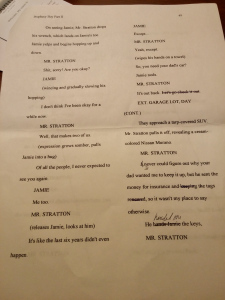Jeffrey Ricker's Blog, page 17
November 7, 2016
What’s it worth?
These days, I admit to feeling more than a little guilty if I’m not spending every spare minute I have working on my book. Which is not to say that I do spend every spare minute working on it, just that whenever I do something other than write (which is often), I feel as if I’m somehow betraying something. That I’m not really a writer. That I don’t want it badly enough. That the idea isn’t compelling enough to try to get out on paper.
But then I look at what I’m working on, and it looks like this:

There’s the version that lives on the computer, and the sections of it that I print out twenty pages or so at a time. I cross out large chunks of it and write in between the lines what I think belongs there instead. When I run out of space, I write on the back of the sheet (unless I’ve printed it double sided) or move over to my notebook, where I make a note of what page of the manuscript I was on before I made the switch. Once I get through a twenty-page chunk of manuscript, I start typing it all up again and move on to the next section.
In the meantime, the edits to those twenty pages exist in a sort of limbo where they’re not saved and backed up anywhere except on paper. Whenever I leave the house with them in my bag, I think, if I got mugged, would I ask for the notebook? Probably. If the office were on fire or there were an active shooter, would I grab the bag with the pages before running out? Likely. There was a guy in the news recently because he ran back into a burning home to rescue his computer, which had the only copy of his novel on it. No cloud storage, no backup disc; is he crazy? I thought at the time. Now I’ve got these twenty pages at any one time that I would risk going back for.
So maybe I do want it bad enough.
Wow, you made it all the way to the bottom. I’m hoping that means you got something out of this. If you know someone who might also find it interesting and fun, not stupid or boring, please pass it along. And if something struck a chord with you, good or bad, email me. I actually love email. Thanks!


October 31, 2016
An excerpt from my story “Shepherd”
You may recall that recently (I think it was August? Wow, where has the time gone? I know, I know, it doesn’t really go anywhere, it’s us who travel through it in a linear fashion, but wow do I seem to be traveling through it quickly lately).
Wait, what was I saying? Right. I mentioned recently that I have a story coming out in the second issue of Foglifter magazine. Well, guess what? The issue’s out!
Pretty, isn’t it? In addition to me, it includes stories by some other writers I know, including Ed Moreno and Celeste Chan, who are both lovely people I met during the Lambda Emerging Writers Retreat in 2014. My copy is on its way, and I can’t wait to read what everyone else has written. (Have I also mentioned Jewelle Gomez is in this issue too? OMG.)
You can buy a copy from their website, which of course I encourage. In the meantime, though, you may also recall I promised an excerpt from the story once the issue was out. Let it never be said I don’t keep my promises.
Shepherd
Joe and Ed never did figure out where the dog came from. Their summer house, nestled in rustling knee-high grass and surrounded by black locust trees, had no immediate neighbors, and the only road was their long and winding gravel driveway.
“Summer house” made it sound grander than it was. It was a cabin that happened to have indoor plumbing and unreliable electricity. They kept a kerosene lantern just in case. There was no air conditioning, but it was still cooler than it was in the city, and the sea breeze made up for the primitive charm. Joe liked to leave the windows open so he could listen to the ocean’s ever-present background hum, somewhere out of sight.
Joe leaned over the kitchen sink, hands bracing against the porcelain edge slippery with soap, and peered out the window. “Ed, come look at this dog,” he called. This was the first time.
The fawn and black dog waded through the grass as if swimming through water, nose held just above the surface. He came from the direction of the woods, not the road, and paused at the white picket fence surrounding the property. After a moment, he nudged the gate with his snout and came into the yard.
As Ed took up a spot to his left, Joe felt a chill rush over him, though the breeze coming through the window as the sun set was only mildly cool.
“Where do you think he came from?” Ed asked.
Joe wiped his hands on a dishtowel. “I didn’t see him come up by the road.”
Ed leaned against the sink, the freckles showing on his arms as the sleeves of his t-shirt rode up a little. He always freckled in the summer. “Pretty, isn’t he?”
As Joe reached for the doorknob, Ed came up behind him and covered Joe’s hand with his. “Let me go first.”
For a moment, Joe let Ed’s hand remain there, enjoying the warm feeling that spread through his chest at the contact; then, as if remembering to be irritated, he withdrew his hand. “It’s just a dog,” he said.
“You never know.”
Joe didn’t wait, though, and followed Ed out the door and down the step. The dog stopped in the grass maybe twenty yards from the cabin and stood regarding them, its jaw slightly agape, as if smiling hesitantly.
“Here, boy.” Ed sat on the bottom step and leaned forward, hand outstretched toward the shepherd. Joe leaned against the doorframe and, arms crossed, watched as the dog edged closer until, eventually, he pressed his wet nose into Ed’s palm. Ed smiled and ran his hand through the thick fur at the dog’s neck.
“Doesn’t look like a stray.” Ed frowned. “No collar, though.”
“Think someone dumped him?”
“Maybe.” Ed’s jaw worked with some unspoken irritation. “Not right just abandoning a dog like this.”
The shepherd circled around, presenting his flank to Ed while facing Joe, who leaned down to let him sniff his hand, which was red and irritated from washing the dishes. He stroked the dog’s ears for a moment before hugging his arms to himself again. The golden, slanting light of sunset made the lawn look on fire, but Joe was starting to feel chilly. It was late July, and it should have been warm, even hot. But it wasn’t.
Ed yawned. The long commute into work had to be wearing on him, but he insisted it was fine, and besides, he loved coming home every night to the peace and quiet of the shore, which was good for Joe.
In August, though, their lease would be up and they’d have no choice but to close up and head back to their apartment in the city for the fall.
The dog turned away from them at the same time Joe heard the whistle of a bird, a frantic, three-note song that repeated. The dog took a step away from them, which seemed to spur something in Ed.
“Hey, buddy. Here, buddy,” he called. The dog turned, but then the bird sang again. It was a whippoorwill. Joe read once that those birds could hear the sound of a soul departing the earth, and since then, their song had left him cold.
To read the rest, go pick up a copy. Or, if you ask me really nicely the next time I see you, maybe I’ll read it to you….
(Hey, you made it all the way to the bottom of this post. That’s awesome. If you liked it, I have an e-mail newsletter. You should totally sign up for it. I might surprise you with stuff you don’t get to see here, or anywhere else, for that matter.)


October 24, 2016
A beginner’s mind at 47

I’m not going to lie, 47 sometimes feels pretty old. Joints are creaky, I can’t jump as high or run as fast as I used to, and eating a whole pizza in one sitting is far behind me. (I probably shouldn’t have been doing that in the first place, but yes, there was a time when I could eat a whole pizza, usually thick crust, and not feel even the least bit sluggish the next day. That was probably the only good thing about my twenties, however.)
The one time I don’t feel old, though, is when I’m writing. That’s not to say that writing makes me feel young. But it does make me feel like a beginner.
This probably doesn’t come as a surprise to the writers I know. A scroll through the Facebook or Twitter timelines (which I don’t do very often and definitely don’t encourage, especially during election season, unless you want to find reasons to end friendships) shows a lot of my writer friends struggling with characters, writing themselves out of corners, or just plain trying to figure out what their title is. (Hi, ’Nathan.)
I think this is a good thing.
Why? Well, confirmation bias, for one thing. I experience it, therefore I look for it; I find it, therefore it’s legit. To me, anyway. This is just my way of reminding that this is one (older) guy rambling into his keyboard, so take it all with that in mind.
So why do I think it helps me? Beginner’s mind is what keeps me writing. Even when it’s eye-wateringly difficult, approaching a book or a story is never the same drudgery that working a 9-to-5 job, even the best one, can be. (I’ve experienced both.) The challenge is always shifting with every new project. You do learn how to write a book, eventually; but with each new one, you’re learning how to write that book. Right now, I’m learning how to write a sequel, and between you and me? Not easy. But it’s definitely interesting, which is what keeps me doing it.
For another year, at least.


October 17, 2016
They can’t steal it if you give it away
This is a post about pirates. No, not pirates of the “arr matey” and “shiver me timbers” and walking the plank variety. These are the digital kind. I’ll explain.
It probably seems pretty egocentric of me to have a Google alert set up for my name, right? Not so fast, though. First of all, I don’t think Google’s algorithms for this tool are very good; most of the time, they don’t even pick up the posts on my website. But anyway, the real reason I have it set up is for things like this:
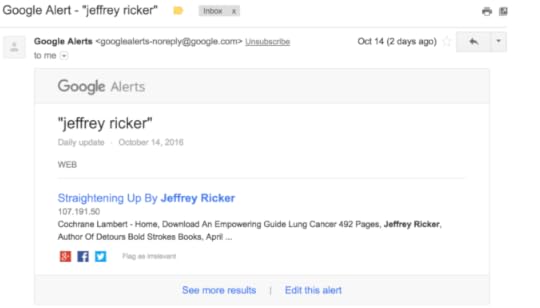
This is a link to a site online where you can download a story of mine for free. This story was for sale through Untreed Reads for a number of years, and this past year we quietly took it down along with two other stories. It’s been years since they were first published, and the market for one-off short stories is giving way to one-off novellas or long-form essays (Kindle Singles are an example), and I figured, well, I’ve made my money off those, maybe I’ll do something with them later.
And then I got that notice.
Now, usually, if it’s one of my novels that pops up, I send a takedown notice (which sounds like a wrestling move, right?) in line with the Digital Millennium Copyright Act, owner of the copyright, good-faith belief my rights are being infringed, yada yada. Usually it works, and sometimes I get back a mealymouthed “well that’s not actually on our servers so we can’t do anything about it” yeah kiss my grits. But in this case, for this short story, you know what? Here.
I’ve been meaning to start learning how to format stories and books for epub format, and this was as good an excuse as any. (By the way, I figured it out from this post by Jane Friedman, in case you’re interested. I was using Calibre before, but the Sigil user interface is much friendlier and requires less time in code view.) Here it is in PDF, if that’s more your speed. Of course, I haven’t had time to think about creating cover art for it, so all you get is the story, but maybe later I’ll see what I can do. Also worth bearing in mind is that I wrote this in 2012. I think my writing has changed a little since then, but I still think it’s a fun story. It’s somewhat Christmas related, so if you want to be truly seasonal, save it until December.
Suck it, pirates.


October 10, 2016
How revision looks from here
As you know, I’ve been revising the as-yet-unnamed sequel to The Unwanted. Actually, it’s gone through several different potential names but I’m still not happy with them. I’ve thought of a Wrath of X title but a) would that give away too much? and also b) Khaaaaaaaan! So maybe something else.
Wait, where was I? Revising, right. I’m about at the halfway point in the novel right now, and this is a section that I was having a bit of trouble with while I was writing the first draft, so I wrote it in script format. It’s a trick I read about on Chuck Wendig’s blog so I wanted to try it out, and it really helped me maintain momentum. I knew it would mean extra work in revision, and sure enough, I was right.
But what I’m doing in this section is reminiscent of what I’ve done in every other section up to this point. That is, I’m cutting huge chunks and rewriting a lot more wholesale. If you’re in revision mode, I thought it might be helpful to see some of what I’ve done as an example.
Here’s a passage of script from the first draft—click to enlarge (and no, I don’t think it gives away any more than you’d be able to figure out from the book jacket):
Now here’s the rewrite (it’s a little long):
Mrs. Rose dropped us off at Stratton’s garage. Before she left, she leaned out her window and beckoned me back to her SUV.
“Are you sure you don’t want me to wait?”
I shook my head. “We’re just picking up Dad’s car and heading out.”
She frowned. “Somehow, I doubt it’ll be as straightforward as that.”
I turned to stare at the garage entrance. “That’s what I’m afraid of.” I tried to smile when I turned back to her. “But what can you do, right?”
She looked over her sunglasses. “What you can do is be careful. And if you run into any trouble please, please call us.”
She reached out the window and touched my cheek. “And tell my daughter to call her mother if she wants to stay in the will.”
Winking, she drew back her hand and rolled up the window. I watched until she turned the corner and disappeared from sight, then faced the building again.
Carlos and Artemis were standing off to the side with Dakota and our bags. Now, Carlos edged up to my side.
“Now what?” he asked.
“Wait here. I’ll be right back.”
From outside, the garage looked dark and cave-like. Inside, though, it was bright and—not what I would expect for a garage—clean. There were three bays, each two cars deep, and they were all full. There were pits in the floor under each car so mechanics could work on whatever you worked on under a car. (I don’t know, mufflers and stuff? So not a mechanic here.) Fluorescent lights buzzed overhead, though you could only hear that every so often when the banging of tools and that vweep vweep noise of pneumatic thingies died down.
The gray tile floor was slick and clean—I wondered how long it stayed that way—as I walked in and started peering over and under the cars, looking for Mr. Stratton. It’s weird how you can recognize a person just by seeing them from the wait down (and I know yes that sounds weird and kind of pervy but shut up), but from the jeans and the workboots of the man leaning sideways under the open hood of a car in the back, I could tell it was Billy’s dad.
“Mr. Stratton?”
Okay, not such a good idea to practically sneak up on a guy who’s into a car practically up to his waist. He banged his head on the hood.
“Ow! God damn—”
“Sorry, sorry!” I rushed forward. “Are you okay?”
Rubbing his head with one hand, Mr. Stratton looked up at me and dropped the wrench he was holding. On my foot.
Yeah, guess I deserved that, right?
I hadn’t even stopped hopping around, trying not to let my now-throbbing foot touch the ground, when Mr. Stratton hugged me hard.
“Of everyone who could’ve walked in here,” he said, “I never expected to see you again.”
“Me neither,” I said.
There’s not a lot left from that first draft, is there? As I’ve been going along, I’ve been cutting text in five or six-hundred-word swaths; more, in some cases. At one point, I realized most of chapter 4 was tedious introspection (pro tip: most introspection is tedious), so I cut it. The whole chapter. Boom. Gone.
The same problem came back in chapter 8, so I cut just about everything except two paragraphs, combined it with chapter 9, and now what was chapter 11 in the first draft is chapter 9 in the second draft and, well, let’s just say I’m glad word-processing programs exist to make keeping track of all these changes so much easier.
There was a lot of stuff that it seems I put down on the page just because I had to get it clear in my own head, but it was—let’s not mince words—dead boring when I reread it. And if the writer’s bored reading it, imagine how the reader would feel. So cut it. Still need something in that empty space? Then write something different. Figure out what would make it more complicated for your characters, and that’ll probably be more interesting for the reader too.
I have no idea if I’ve managed to do that, and I know that this section will probably change further before I’m completely satisfied with it. What I know for sure is that I don’t miss the parts I cut.


October 3, 2016
Writing prompt: You’re the coyote
Some people talk to their therapists, or their bartenders. I talk to the people who cut my hair. When I was getting a trim earlier this week, we got on the topic of tattoos. She had lots, and I only have a couple. I want another one, a larger one, but I want it to be something meaningful to me, and I haven’t quite figured out what.
“I have this recurring dream, though,” I told her.
Snip snip, comb, tug. “What’s your dream?”
“Well, I’m in this desert landscape, and I’m following a coyote.
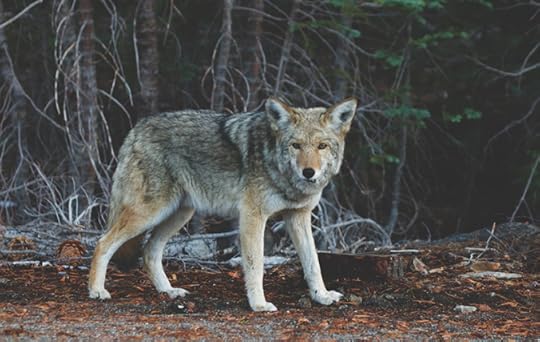 (Awesome coyote photo courtesy of Josh Felise, Unslpash)
(Awesome coyote photo courtesy of Josh Felise, Unslpash)
“And he goes into this house that’s out here in the middle of nowhere, and it’s kind of surreal because it has openings for windows but no windows, you know?”
“No windows. Weird. What next?”
“Well anyway, he goes inside and I follow him in, and he goes into a bedroom where there’s a bed, and he crawls underneath the covers like he’s hiding. But when I walk in, I can see the lump under the covers that’s him, so I say, ‘You know I can see you.’ And he says, ‘I know.’” (Because if a coyote talks in your dream, that just makes logical sense, right?—ed.)
“And that’s when I wake up. So I’ve been thinking a tattoo of a coyote, but I want to figure out what he stands for first.”
“Naw,” she said. “You’re the coyote.”
“I am?”
“Yeah. And the desert, that’s so surreal and barren, you know? Have you ever been to the desert?”
“I lived there for four years when I was growing up.”
“Maybe there’s something you still need from the desert. Maybe you should go back.”
She kept cutting and combing, and I said, “Maybe I should.”
So, there’s your writing prompt, which is kind of a mad-libs type prompt: take an animal, a landscape, and a building—they can be of any kind—and write something incorporating all three. Meanwhile, I’m going to see if I can’t figure out what my coyote tattoo should look like.


September 26, 2016
Stay on the horse
I’m always impressed by artists in one medium who can excel in another medium as well. This recording by Philip Glass (Spotify link) has got me thinking about playing the piano again.
I’m not sure why I’m drawn to this so particularly. I’m pretty sure it’s in a minor key, and I’ve always felt more like a minor than a major; there’s something sort of conditional about the minor keys, like they’re getting away with something and they’re trying to keep you guessing which way they’re going to go next.
Sounds kind of like writing, to me.
I don’t have access to a piano at the moment, but in grad school I got to play nearly every day on a pretty nice grand piano (that would quickly go out of tune because people would leave the windows near it open all night; cold and humidity? Not a good combination for pianos). I took lessons from my friend Anita, a wonderful PhD music education student, and I miss that (and her, and lots of people from grad school). At that time, I knew writers who were musicians, architects who were painters, and musicians and scientists who were painters and musicians and poets, and I pretty much envied them all—and at the same time felt like this one-trick pony who could sort of string words together and make them fake sense.
The thing I’ve realized is I’m not a one-trick pony, though. I’ve played piano off and on since I was about eight; it’s just that I never stuck with it or had the consistent opportunity to do so (pianos are, after all, a) big, and b) expensive). Likewise, I was able to get out of gym classes in high school and keep taking art instead, something I continued to do when I got to college where I took drawing and ceramics classes. I had a drawing instructor ask me once, “Why aren’t you an art major?” And I had to stop and think about it. Why wasn’t I?
In the end, I think it was arbitrary. If you want to learn something, if you want to get good at it, you’ve got to keep doing it. I didn’t start out making decent ceramics or drawing recognizable faces, but I stuck with it long enough to become competent. Same with the piano. When I was eight, I played long enough to reach the point where I’d start playing the teacher accompaniment, because her part was always the most fun. But then I’d stop for a while—in this case, “a while” being seven years—and I’d lose that competence.
True confession: I don’t know how to ride a horse, so maybe I shouldn’t be using this analogy. I’ve only been on a horse once that I can remember. They’re beautiful animals, and I’d love to know how to ride. But I’d have to spend a lot of time on horseback, I think, to accomplish that.
I haven’t even stuck with writing consistently since I started. There were years in my twenties, when I was just out of college and trying to make a living, where I didn’t sit down at the keyboard or pick up the pen to work on stories. It is, however, the thing I’ve stuck with the most consistently, for the longest time, throughout my life. (The other things I’ve stuck with most consistently are running, Star Trek, and beer, but at least two of those don’t count, and the other one I do mostly out of adrenaline and spite.) It’s the horse I’ve ridden the longest.
If you want to get good at something, stay on the horse.


September 19, 2016
Upcoming story in Foglifter
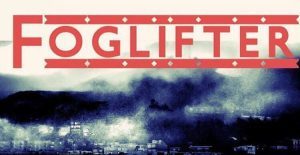 If you follow me on the Twitter or the Facebook or the Instagram, you might have heard about this already, but I figured it was worth mentioning again here. I’ve got a story coming out in Issue Two of Foglifter Journal. It’s a relatively new litmag published in San Francisco and dedicated to writing by queer writers. My story, “Shepherd,” is a little queer and a little strange, and features (surprise, surprise!) a dog. I’ll share a snippet of it a little closer to publication date, but in the meantime, go check out the magazine.
If you follow me on the Twitter or the Facebook or the Instagram, you might have heard about this already, but I figured it was worth mentioning again here. I’ve got a story coming out in Issue Two of Foglifter Journal. It’s a relatively new litmag published in San Francisco and dedicated to writing by queer writers. My story, “Shepherd,” is a little queer and a little strange, and features (surprise, surprise!) a dog. I’ll share a snippet of it a little closer to publication date, but in the meantime, go check out the magazine.
And hey, check out the list of contributors for Issue Two. Look who I’m just below: Jewelle Gomez! I read that and thought, “OMG, I’m going to be in the same magazine as Jewelle Gomez? Am I worthy?” Not only that, but five (FIVE) writers I met when I was a Lambda fellow. It’s gonna be like old home week in print!


September 12, 2016
What I’ve been reading lately
I’ve heard of some writers—I’ll be honest, I can’t remember their names at the moment, so this might be one of those “My best friend’s sister’s boyfriend’s brother’s girlfriend heard from this guy who knows this kid who’s going with the girl who saw Ferris pass out at 31 Flavors last night. I guess it’s pretty serious” kind of things.
Wait, where was I? Oh, right. Some writers don’t like to read heavily when they’re deep in their own writing. Me, I don’t think I could function if I stopped reading for that long. I’ve been reading a lot of science fiction recently because, surprise, that’s also what I like writing a lot. Here are the three that have captivated me the most recently:
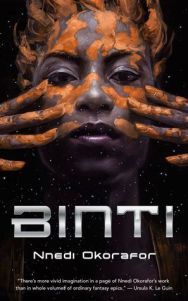 This novella by Nnedi Okorafor won a Hugo Award this year. (If you’re a fan of science fiction and fantasy, you may have heard some of the controversy surrounding a bunch of frightened straight white guys who have been outraged that speculative fiction by people who are—gasp!—writers of color have been getting published and actually winning awards.) Part of me read it simply to be contrarian—I like tweaking the sensibilities of straight white guys sometimes, who mistake equity for discrimination. Here’s the thing, though: it’s just a really darn good story. It’s about a girl who’s the first of the Himba people to get a place at Oomza University, the best institution of higher learning in the galaxy. On her journey there, things take a bit of a left turn at Albuquerque, and she suddenly finds herself caught in the middle of a conflict that has nothing to do with her, but she might be the only person who can stop it before more bloodshed occurs. It’s edge-of-your-seat reading that’s also beautifully written.
This novella by Nnedi Okorafor won a Hugo Award this year. (If you’re a fan of science fiction and fantasy, you may have heard some of the controversy surrounding a bunch of frightened straight white guys who have been outraged that speculative fiction by people who are—gasp!—writers of color have been getting published and actually winning awards.) Part of me read it simply to be contrarian—I like tweaking the sensibilities of straight white guys sometimes, who mistake equity for discrimination. Here’s the thing, though: it’s just a really darn good story. It’s about a girl who’s the first of the Himba people to get a place at Oomza University, the best institution of higher learning in the galaxy. On her journey there, things take a bit of a left turn at Albuquerque, and she suddenly finds herself caught in the middle of a conflict that has nothing to do with her, but she might be the only person who can stop it before more bloodshed occurs. It’s edge-of-your-seat reading that’s also beautifully written.
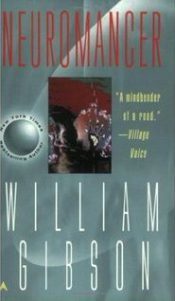 The William Gibson novel that is credited with starting the cyberpunk movement may be a little bit dated in terms of some of its technology—it was published in 1984, after all—but it’s absolutely prescient when it comes to our always connected society, and it’s also a gripping story of data thieves, sentient AIs, and a shady and reclusive business clan overseeing their affairs from orbit, and often cryogenic sleep. Think a smarter version of The Matrix about twenty years before anyone thought of The Matrix.
The William Gibson novel that is credited with starting the cyberpunk movement may be a little bit dated in terms of some of its technology—it was published in 1984, after all—but it’s absolutely prescient when it comes to our always connected society, and it’s also a gripping story of data thieves, sentient AIs, and a shady and reclusive business clan overseeing their affairs from orbit, and often cryogenic sleep. Think a smarter version of The Matrix about twenty years before anyone thought of The Matrix.
勢孤取和 (Influence Isolated, Make Peace)
This science fiction story by John Chu, I choose to read as a love story, really. It’s between Jake, a cyborg—whom a peace treaty now classifies as a weapon—and Tyler, a substantially modified human, both at odds, one of them very likely for his own survival and that of his kind. It’s tense and flirtatious and the game Go plays an important part in it. I’ve never played, but after reading this, I’d be interested in trying.
So, what are you reading?


September 5, 2016
Do the difficult thing
I’ve been thinking a lot about revision lately, mainly because I’m in the middle of a big one. When I do my revising, I always start with a hard copy. This is probably old-fashioned—really, I’m not a Luddite; no, I mean it, stop laughing—but it serves a purpose, I’ve discovered. First, I think it allows me to step back from the actual process of writing. When it’s literally on paper, I treat it differently than I do when the words are on screen. You’d think I’d approach them with a greater sense of finality, right? I mean, it’s concrete when it’s on paper.
Instead, I end up doing things like this:
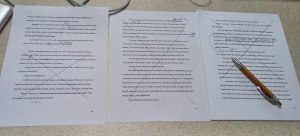
I can see the bigger picture when it’s on the page. Literally, I spread out several pages at a time and can see more of the whole story than I can in the rectangle of text viewable at any given time on the screen.
But something else happens when I transcribe those handwritten edits into the file. I rethink, second-guess, mull things over, undo my changes combine chapters, and sometimes, I’ll delete entire pages at one time. That one revision step, then, turns into two or three or, sometimes, more. So, for example, while I’ve made revision notes on the manuscript up to chapter eight, I’m also working on transcribing chapter four, after deleting half of chapter three with a plan to cut down chapter four and combine the two. Because what I noticed as I was revising is that the pace needs to pick up, a lot.
I don’t know if I would have recognized that if I was strictly working on the screen. Maybe I would have, who knows? All I know is, this works for me. Because it’s the way I make myself do the hard revisions. The things where you’re looking beyond just moving a sentence, deleting a dialogue tag, or fixing a continuity error.
And sometimes, something will come at you right out of left field—or maybe right field, depending. It’s been a while since I played baseball in Little League. Anyway, my point is, as I’ve been working my way through the edits I’ve made so far, I hit on an idea for my main character that would change how much he knows (or rather, how much he doesn’t know) at the start of the book. It would really put him in the soup, which would be a lot more interesting, I think. However, it would also put me in the soup, as it would require rewriting everything I’ve already revised.
I’m going to at least try it, because I can’t know for sure if it’ll work until I see how it works out on paper. If it makes a big difference with the first couple chapters, I’ll know it’s worth going to the effort the rest of the way through the book. And I think it’ll pay off when I get to the middle, which is always the trickiest part of a book for me.
Wish me luck.




